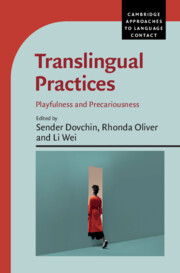Book contents
- Translingual Practices
- Cambridge Approaches to Language Contact
- Translingual Practices
- Copyright page
- Contents
- Figures
- Tables
- Contributors
- Foreword
- Acknowledgements
- 1 Introduction
- Part I Beyond Translingual Playfulness
- Part II Online Activism
- 6 “Are You Poor?”
- 7 Instagram and Language Use
- 8 Translingual Narratives in Precarity
- Part III Critical Pedagogy
- Part IV Ways Forward
- Index
- References
6 - “Are You Poor?”
Relational Transpositioning through Local and Transnational Transmodal Communications
from Part II - Online Activism
Published online by Cambridge University Press: 07 May 2024
- Translingual Practices
- Cambridge Approaches to Language Contact
- Translingual Practices
- Copyright page
- Contents
- Figures
- Tables
- Contributors
- Foreword
- Acknowledgements
- 1 Introduction
- Part I Beyond Translingual Playfulness
- Part II Online Activism
- 6 “Are You Poor?”
- 7 Instagram and Language Use
- 8 Translingual Narratives in Precarity
- Part III Critical Pedagogy
- Part IV Ways Forward
- Index
- References
Summary
This chapter takes as a foundation that relations and understandings between people, particularly those from different social spheres, matter. Through dual lenses of critical cosmopolitanism- which posits the need for encounters based on openness, equity and caring, and transmodalities- which postulates five complexities of ‘trans’-era communications, we analyse digitally-mediated communications among groups of youth from disparate under-resourced communities as they create, share and discuss digital stories on a dedicated website. In particular, we explore exchanges between youth from a rural Ugandan village and those from a large Indian slum as they compose videos and messages intended to highlight their resourcefulness and innovation: through the entanglement of languaging, resources, materiality, culture, place and ideologies, each group mis/interprets and positions the other through a lens of ‘deficiency’. While translanguaging attends to flexibility and fluidity of language-in-use, transmodalities attends to semiotic processes through which people make sense of themselves, one another and the world. A transmodal analysis of videos, chats, interviews and group meetings recasts ‘disparity’ and ‘peripherality’, as, through transnational engagements, youths’ emergent understandings of global others’ lives and their own, and of relationships being forged, transcend labels to illuminate emic perspectives, challenging (and sometimes reifying) these constructs.
- Type
- Chapter
- Information
- Translingual PracticesPlayfulness and Precariousness, pp. 105 - 122Publisher: Cambridge University PressPrint publication year: 2024

